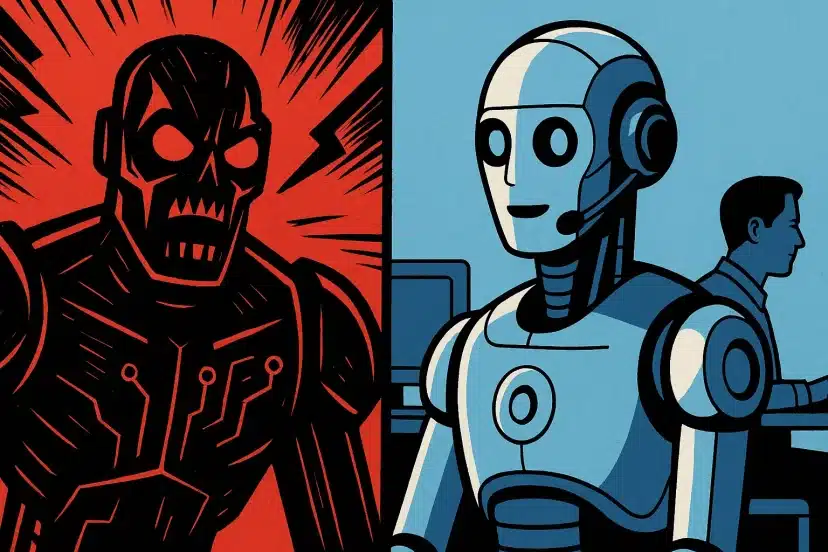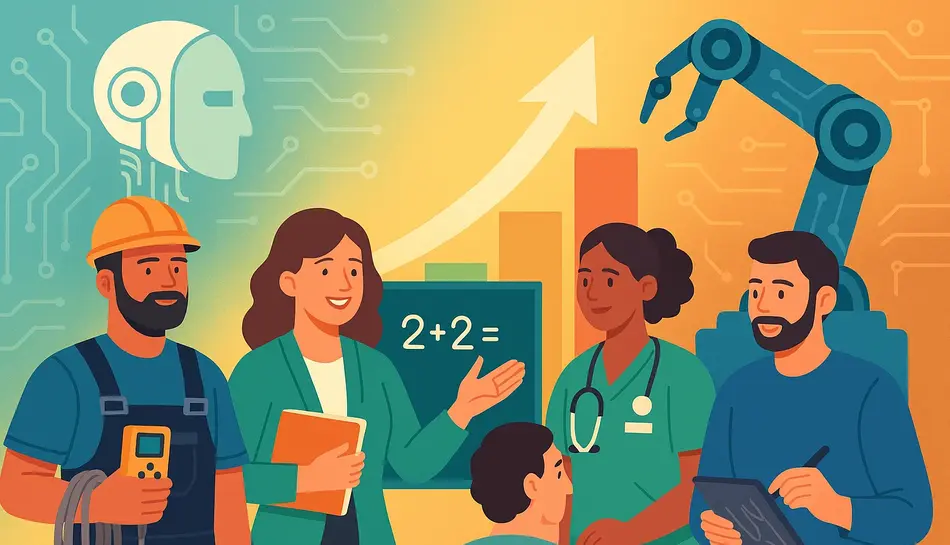Jobs Will AI Not Replace
is the question on everyone’s mind in 2025. The headlines may be full of warnings about artificial intelligence eliminating work, but the real story is more nuanced and far more hopeful. While some white-collar roles are certainly at risk, the smartest companies are hiring more humans, not fewer. From legal experts to plumbers, creators to AI specialists, careers where being human is the greatest competitive advantage are thriving.This article explores which skills are future-proof, how much you can earn, and the steps you should take today to build an AI-resilient career.
The AI Panic vs. Reality
Over the past two years, workers have been inundated with warnings about AI. Executives like Ford’s Jim Farley have predicted that “AI will literally replace half of all white-collar workers.” Amazon’s Andy Jassy has admitted that workforce reductions are likely as automation spreads.
But the data paints a different picture.
- MIT research found that most jobs simply aren’t economically viable to automate right now—it’s still cheaper to hire people.
- The World Economic Forum projects 11 million new AI-related jobs will be created, even as some roles decline.
- PwC’s 2025 AI Jobs Barometer, which analyzed nearly 1 billion job postings, revealed that industries most exposed to AI are seeing 3x higher revenue growth per employee than industries least exposed.
And here’s the kicker: wages in AI-exposed industries are rising twice as fast as elsewhere. Workers with AI skills now earn a 56% wage premium, up from 25% just last year.
In short: yes, AI is changing work. But instead of destroying jobs wholesale, it’s reshaping which jobs thrive.

The Human Edge: Why Being Human Still Pays
The future isn’t about humans versus machines—it’s about humans with machines. The most future-proof careers are those that maximize the uniquely human traits AI can’t replicate: empathy, judgment, creativity, and adaptability.
Stanford’s research calls these “psychological premium” skills, and MIT summarizes them under the EPOCH framework:
- Empathy
- Presence
- Opinion/Ethics
- Creativity
- Hope/Leadership
Careers that rely heavily on these human elements are proving to be not just resilient, but more valuable
Category 1: The Human-Connection Powerhouses
Roles that require deep trust, judgment, and interpersonal interaction are showing near-perfect resistance to automation.
- Lawyers – AI can assist with contracts and analysis, but when it comes to judgment, strategy, and advocacy, humans remain irreplaceable. Average salary: $135,000+.
- Doctors & Medical Specialists – Medicine involves life-or-death decisions and patient trust. While AI aids diagnosis, human doctors are essential. Average salary: $200,000+.
- HR Managers – Hiring, mentoring, and managing people requires nuanced human interaction. Average salary: $85,000–$150,000.
📈 These roles not only resist automation but are becoming premium positions as companies prize human leadership alongside AI tools.
Category 2: Creators and Culture Builders
Far from killing creativity, AI is fueling it. McKinsey reports that creative roles are gaining value because AI generates content but not meaning.
High-paying creative careers thriving in 2025 include:
- Creative Directors – $140,000–$220,000
- UX/UI Designers (AI-enhanced) – $110,000–$170,000
- Content Strategists (AI-savvy) – $90,000–$145,000
- Brand Architects – $116,000–$172,000
AI is the tool, but humans are still the conductors. The professionals who harness AI to create culture, strategy, and vision are in demand.
Category 3: The Human–AI Hybrid Roles
Perhaps the most exciting new frontier is the rise of AI-human collaboration jobs. These are roles born from AI—not threatened by it.
- AI Prompt Engineers – $130,000–$200,000
- AI Ethics Officers – $150,000–$220,000
- Human–AI Interaction Designers – $140,000–$190,000
- AI Training Data Specialists – $110,000–$160,000
- AI Implementation Managers – $160,000–$240,000
These careers combine technical knowledge with human oversight, ensuring AI systems are accurate, ethical, and user-friendly.
Category 4: The Skilled Trades Renaissance
AI may write code, but it can’t fix a broken pipe—or install a solar panel. MIT’s research on automation limitations shows that skilled trades are surging.
- Electricians – Median $78,000, with 6% annual growth
- Plumbers – Median $72,000, with strong demand across the U.S.
- HVAC Technicians – $70,000+, 15% growth
- Renewable Energy Technicians – $85,000+, 52% growth (fastest in the economy)
These jobs thrive because they combine physical complexity, problem-solving, and customer interaction—all areas where AI still struggles.
Explore the Jobs AI Can’t Replace
From doctors to designers, electricians to AI engineers—find thousands of future-proof careers on WhatJobs today.
Search Jobs Now →Strategy: How to Future-Proof Your Career
Here are three steps you can take right now:
- Develop Your Human Advantage – Focus on EPOCH skills: empathy, creativity, ethics, and leadership. These will only grow in value.
- Become an AI Multiplier – Learn to use AI tools in your field. According to Microsoft, workers who direct AI see productivity gains of 30–50%.
- Position at Growth Intersections – Choose roles where human judgment meets AI innovation, such as healthcare tech, HR analytics, or AI-assisted law.
The takeaway? You don’t need to fear AI—you need to work with it, not against it.
Final Word: Your Humanity Is the Advantage
The future of work is not about outcompeting machines. It’s about doubling down on what makes us human. Empathy. Creativity. Judgment. Leadership.
As venture capitalist Marc Andreessen put it, the industries that thrive aren’t those built only on data—they’re the ones built on human judgment and relationships.
AI can make us faster and more efficient, but it can’t replace meaning. And meaning, ultimately, is what drives careers, companies, and cultures forward.
FAQs About AI and the Future of Work
Q1. Which jobs are safest from AI replacement?
Jobs with high human interaction and low automation potential—such as lawyers, doctors, HR managers, and skilled trades—are the most AI-resistant.
Q2. Are creative jobs at risk from AI?
No. In fact, creative jobs are thriving. AI can generate art or text, but it cannot generate culture. Roles like creative directors, brand architects, and UX designers are seeing rising salaries.
Q3. Do I need a tech degree to work in AI-related fields?
Not always. While some roles require technical training, hybrid positions like AI ethics officers, interaction designers, or even skilled trades integrated with smart systems do not require traditional computer science backgrounds.
Q4. What’s the best way to prepare for the future job market?
Focus on two things: developing uniquely human skills (empathy, creativity, leadership) and mastering AI tools in your field. This combination maximizes both security and earning potential.




